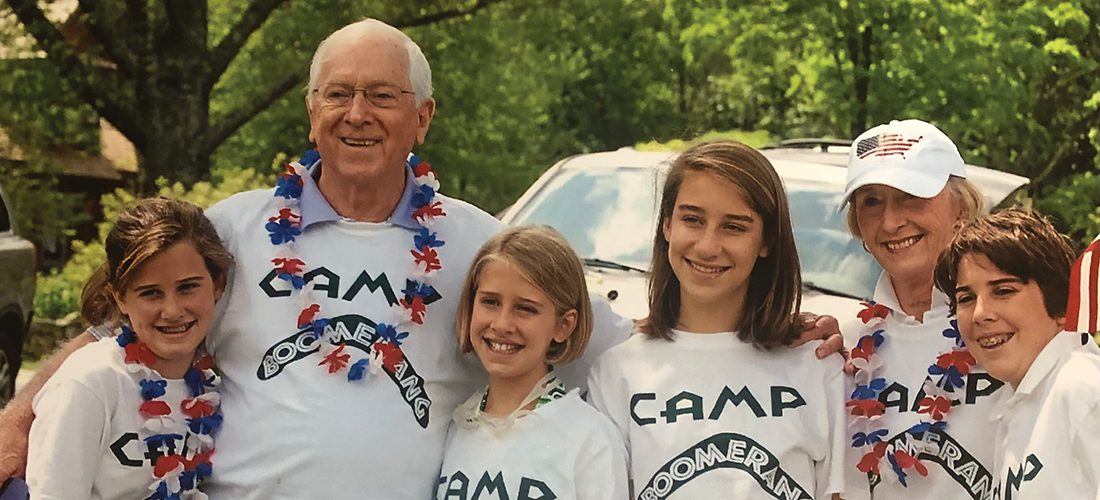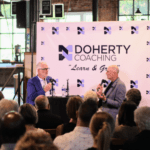Pillars: Jim Babb
November 1, 2022

A Charlotte broadcasting pioneer’s innovative career
by Vanessa Infanzon | photographs courtesy Jim Babb
Jim Babb may owe his lifelong career in journalism and broadcasting to Dilworth Highlights and Headlines, the school newspaper at his Charlotte elementary school. Since then, he’s been devoted to telling stories and forwarding the television and radio industry.
Born in Manhattan, Babb’s family moved to Charlotte in 1937. In high school, he was a sports correspondent for The Charlotte News and The Charlotte Observer. He attended Newberry College on a football scholarship for one semester, then switched to UNC Chapel Hill to study journalism. Unable to afford tuition, he left after two years and joined the U.S. Army. A lieutenant noticed his love of writing and helped him land a public-information job covering sports at Fort Jackson in Columbia, S.C.
After completing his military obligation, Babb earned a bachelor’s degree in business from Belmont Abbey College in 1959. His first job at Charlotte’s WBTV required him to write promotional articles about TV personalities. He met his wife, Mary Lou, while hand-delivering the stories to The Charlotte Observer, where she wrote for the “women’s pages.”


James Corden, host of The Late Show, Amy Liz Pittenger Collins of Charlotte’s Bahakel Communications and Babb
He spent the next three decades with WBTV and its owner, Greensboro-based Jefferson-Pilot Broadcasting. He was the station’s general manager in the mid-1970s, then became an executive vice president in 1978 and the broadcaster’s CEO in 1988.
A tiff with longtime Jefferson-Pilot CEO Roger Soles prompted his departure in 1991. He soon became president of Outlet Communications, a smaller TV and radio broadcaster headquartered in Providence, R.I.
He ended his career in 2018 as executive vice president at Charlotte-based Bahakel Communications. His achievements include an Emmy Award for lifetime achievement from the National Academy of Television and an induction into the North Carolina Association of Broadcasters Hall of Fame.
Babb, 90, served as president of the North Carolina Association of Broadcasters and chaired boards connected to the National Association of Broadcasters, CBS Television Network Affiliates Advisory Board and YMCA of Central Carolinas. He has been a trustee at Appalachian State, UNC Charlotte and Belmont Abbey, and is a former member of the Board of Governors of the UNC System. When the Arts & Science Council of Charlotte ran its first $1 million campaign in 1982, Babb led the committee.
Babb stays active promoting higher education through the Coalition for Carolina and Higher Ed Works. “There’s a new group being formed called Majority Rising North Carolina,” he says. “We are trying to overturn some Senate districts to try to get a little more balance in the North Carolina legislature.”
Babb and Mary Lou, married 63 years, have five children and six grandchildren. The couple split their time between homes in Charlotte and Linville.


Babb with longtime friend and colleague John Hutchinson at Broadcast Music Inc.’s annual dinner in Las Vegas
Babb with Walter Cronkite (middle), at the famous anchorman’s 1981 retirement dinner at The Four Seasons in New York City
Comments are edited for length and clarity.
The story that got the most attention is one I wrote at Fort Jackson, about the football team. The football coach was a guy by the name of Beattie Feathers. It was an induction center. All these good athletes would come in, and they could keep them right there at Fort Jackson. I wrote the story and sent it to Jack Claiborne who was working at the Observer’s sports department then. Jack put it on the wire. It ran all over the Southeast. (Babb was a high school friend of Claiborne, who had a long Observer career.)
The story got surprisingly big play. I was shocked. Two days later, I get called in by the captain: “The general wants to see us.” We hustle over there. I’m still a Private E1. General Daly says, “You got me in trouble with General Bolling; it’s that story you wrote. It ran in the Atlanta Journal and he read it. He’s mad as hell I’m keeping all the good football players. Don’t send out any more stories like that.” It was the first time I’d ever been criticized for doing a good job.
Ironically, even though Jefferson-Pilot loaned money to all kinds of broadcasters all across the country, they were more conservative with their own company. We had to do organic growth. We grew from one radio station in Charlotte, WBT, [then added WBT FM]. Originally, FM was a big money loser for everyone as we transitioned from AM. We bought stations in Atlanta, Miami and Denver. Those all proved to be very successful. Then we bought radio stations in San Diego.
Back in 1968, things were really getting complicated in keeping inventory [of advertising spots] and scheduling. I didn’t know a thing about computers then, or now, but I knew we needed a better system to handle our inventory. We just had a Mylar board with a grease pen.
I was having lunch with Charlie Crutchfield, the president of Jefferson-Pilot, at Quail Hollow. I think they just had a tent back then before the clubhouse. I said, ‘We have to get a better system. We’ve got to look into computers.’ We assigned an engineer to head up the computer operations in Charlotte originally, then we did it for the other stations.
Everyone was having the same problems. We launched Jefferson Data Systems in 1968, and it grew quite well. We bought a company in Australia and one in New York that dealt with advertising agencies. It was backroom operations, contracts, inventory control. We grew the company into a $50 million company.
We started Jefferson Production Company back in the 1960s. We had a successful program called, “Arthur Smith and the Crackerjacks.” They were great entertainers, and Arthur was a smart businessman. The show became so successful, Procter & Gamble wanted to run it in other Southern markets. It ran in 35 markets. Then they started producing national commercials. We also had a remote truck to produce sports events like NFL games for CBS.
After a while, the competition and the method of producing commercials changed and became less and less profitable. By 1980, we moved from producing commercials to getting rights to sports events.
In 1982, we got the rights to what was then one of the top sports events in the country, ACC basketball. Then we got the rights to ACC Football. We launched ACC Football Network.
We did a partnership with Raycom Sports in 1982 and we made a bid for $18 million for three years [for ACC basketball.] No one had seen anything like it in the sports syndication business. It shook the business.
Roger Soles was the chairman and president of the company for much of the time I was there. He was very conservative. It was a challenge, to be honest with you.
[I said I would work for Outlet Communications] for two years until we could get someone else installed. It turned out to be the best experience I ever had in business. They were a very successful group of investors. They couldn’t have been better to me. I recommended they buy the Raleigh station [WNCN] and convert it to a CBS station, which I was able to do. I never made a recommendation or request that they turned down during the entire period. That’s the reason I stayed almost five years. SP
Featured Image: Jim and Mary Lou Babb with four of their six grandchildren in Linville.





